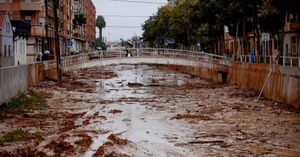Syria is witnessing historic changes as Ahmed al-Sharaa has been appointed the transitional president, marking the end of Bashar al-Assad’s long-standing dictatorship. Following the successful ousting of Assad by the Islamist-led rebel coalition Hayat Tahrir al-Sham (HTS) on December 8, 2024, al-Sharaa pledged on January 30, 2025, to establish an inclusive government capable of rebuilding the war-shattered nation.
"We will work on an inclusive transitional government... with freedom and dignity," al-Sharaa stated during his first address as president, which emphasized the necessity for all Syrians to participate actively in shaping the nation’s future. The newly formed government’s agenda is ambitious, aiming to restore civil administration lawfully during this transitional period.
With the 2012 constitution and Assad’s parliament now abolished, the interim administration is positioning itself to lay down the legal groundwork for future governance. This includes the formation of legislative committees to prepare for free elections, steering clear from the tyrannical rule of the past.
The approval of these changes has generated mixed feelings among international observers. Manhal Baresh, a London-based Syrian researcher, expressed skepticism over the interim government’s authority, stating, "The interim president has neither the right nor the mandate to form a legislative council." He highlighted the risk associated with granting this transitional body too much power too swiftly.
Al-Sharaa’s strategy also involves creating a unified national army from local militias, moving away from the fractured military command previously seen under Assad. During his announcement, he recognized the heavy burden of responsibility before him, saying, "The mission of the victorious is heavy, and their responsibility is immense." The current government is aware of the severe humanitarian crises afflicting the population, which continues to be exacerbated by years of war and economic decline.
Mohammad Abazeed, Syria’s new interim finance minister, offers a stark view of the economic reality: "We expected corruption, but not to this extent." His comments reflect the deeply rooted issues within the Syrian economy, compounded by decades of mismanagement and cronyism under Assad. The focus now is on re-establishing functional state institutions and addressing chronic shortages of basic necessities such as food and medical supplies.
The reality on the ground is complex and fraught with challenges. Various armed factions remain active, each vying for control, even after the major military defeat of the Assad regime. The emergence of these competing loyalties complicates the path toward unity and peace, with many citizens still holding fears from the decade-long civil war.
Humanitarian needs are at their peak, with over 16.7 million people requiring assistance according to United Nations figures. This situation presents the new leadership with the urgent task of not only stabilizing governance but ensuring the safety and wellbeing of its citizens.
Global powers are keeping a close watch on the developments within Syria. Turkey has long been involved with Syrian opposition forces, providing logistical and financial support. Following Assad’s fall, Turkey is positioned to benefit most from the geopolitical shifts, yet tensions persist based on its opposition to Kurdish independence movements. The United States, conversely, continues to support the Kurdish-led Syrian Democratic Forces (SDF), presenting another layer of complexity as various factions work toward their own national interests.
The Iranian regime, once solidly backed by Assad, is now reassessing its influence on the region after the toppling of its ally. Observers note significant instability as Iran, Israel, and other neighboring states recalibrate their strategies, seeking both to exploit and to stabilize the shifting balance of power.
Overall, the situation poses both tremendous challenges and unprecedented opportunities for the people of Syria. Al-Sharaa’s government has indicated its commitment to uphold civil rights and deliver necessary reforms to restore legitimacy among Syrian citizens. He remarked, "Only to which extent, is the question," referring to regional and international expectations surrounding his leadership.
Despite the optimistic rhetoric from the new leadership, many analysts maintain a cautious stance. The roaming question remains whether HTS, previously connected to Al-Qaeda and labeled as a terrorist group by several nations, can shift its identity to fulfill its promise of inclusive governance and human rights compliance.
For the moment, as the dust settles from one of the region’s most pivotal political transitions, the world eyes Syria with both trepidation and hope. Will this transitional government succeed where others have failed, ushering the nation from decades of repression to renewed sovereignty? The onus now lies with al-Sharaa and his administration to deliver on these promises as Syria embarks on this uncharted path toward recovery.



